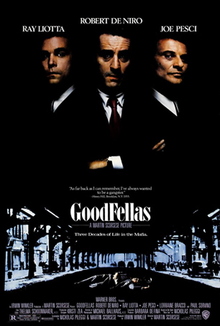Our website is made possible by displaying online advertisements to our visitors.
Please consider supporting us by disabling your ad blocker.
Goodfellas
| GoodFellas | |
|---|---|
 Theatrical release poster | |
| Directed by | Martin Scorsese |
| Screenplay by |
|
| Based on | Wiseguy by Nicholas Pileggi |
| Produced by | Irwin Winkler |
| Starring | |
| Cinematography | Michael Ballhaus |
| Edited by | Thelma Schoonmaker |
Production companies |
|
| Distributed by | Warner Bros.[1] |
Release dates |
|
Running time | 146 minutes[2] |
| Country | United States |
| Language | English |
| Budget | $25 million[3] |
| Box office | $47.1 million[4] |
Goodfellas (stylized as GoodFellas) is a 1990 American biographical gangster film[5] directed by Martin Scorsese, written by Nicholas Pileggi and Scorsese, and produced by Irwin Winkler. It is a film adaptation of Pileggi's 1985 nonfiction book Wiseguy. Starring Robert De Niro, Ray Liotta, Joe Pesci, Lorraine Bracco, and Paul Sorvino, the film narrates the rise and fall of mob associate Henry Hill and his friends and family from 1955 to 1980.
Scorsese initially titled the film Wise Guy and postponed making it; he and Pileggi later changed the title to Goodfellas. To prepare for their roles in the film, De Niro, Pesci and Liotta often spoke with Pileggi, who shared research material left over from writing the book. According to Pesci, improvisation and ad-libbing came out of rehearsals wherein Scorsese gave the actors freedom to do whatever they wanted. The director made transcripts of these sessions, took the lines he liked most and put them into a revised script, which the cast worked from during principal photography.
Goodfellas premiered at the 47th Venice International Film Festival on September 9, 1990, where Scorsese was awarded with the Silver Lion award for Best Director, and was released in the United States on September 19, 1990, by Warner Bros. Pictures. The film grossed $47 million against a budget of $25 million. Goodfellas received widespread acclaim upon release; the critical consensus on review aggregator Rotten Tomatoes calls it "arguably the high point of Martin Scorsese's career". The film was nominated for six Academy Awards, including Best Picture and Best Director, with Pesci winning Best Supporting Actor. The film also won five awards from the British Academy of Film and Television Arts, including Best Film and Best Director, and was named the year's best film by various critics' groups.
Goodfellas is widely regarded as one of the greatest films ever made, particularly in the gangster genre. In 2000, it was deemed "culturally, historically, or aesthetically significant" and selected for preservation in the National Film Registry by the United States Library of Congress.[6][7] Its content and style have been emulated in numerous other pieces of media.[8]
- ^ a b c "Goodfellas (1990)". American Film Institute. Archived from the original on January 24, 2020. Retrieved May 23, 2023.
- ^ "Goodfellas (18)". British Board of Film Classification. September 17, 1990. Archived from the original on March 3, 2016. Retrieved October 22, 2015.
- ^ Cite error: The named reference
Thompsonwas invoked but never defined (see the help page). - ^ Cite error: The named reference
NUMwas invoked but never defined (see the help page). - ^ Ennis, Larissa M. (November 10, 2014). "Off-White Masculinity in Martin Scorsese's Gangster Films". In Baker, Aaron (ed.). A Companion to Martin Scorsese. John Wiley & Sons. p. 181. ISBN 978-1-4443-3861-4. Archived from the original on October 1, 2024.
- ^ "Librarian of Congress Names 25 More Films to National Film Registry". Library of Congress. Archived from the original on April 3, 2019. Retrieved October 8, 2020.
- ^ "Complete National Film Registry Listing". Library of Congress. Archived from the original on October 31, 2016. Retrieved October 8, 2020.
- ^ Merrie, Stephanie (April 29, 2015). "'Goodfellas' is 25. Here's an incomplete list of all the movies that have ripped it off". The Washington Post. Archived from the original on July 28, 2015. Retrieved March 12, 2017.
Previous Page Next Page


